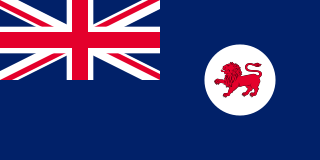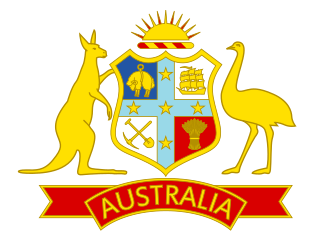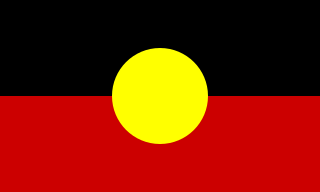
Adelaide is the capital city of South Australia, the state's largest city and the fifth-most populous city in Australia. "Adelaide" may refer to either Greater Adelaide or the Adelaide city centre. The demonym Adelaidean is used to denote the city and the residents of Adelaide. The Traditional Owners of the Adelaide region are the Kaurna. The area of the city centre and surrounding Park Lands is called Tarndanya in the Kaurna language.

New South Wales is a state on the east coast of Australia. It borders Queensland to the north, Victoria to the south, and South Australia to the west. Its coast borders the Coral and Tasman Seas to the east. The Australian Capital Territory and Jervis Bay Territory are enclaves within the state. New South Wales' state capital is Sydney, which is also Australia's most populous city. In December 2021, the population of New South Wales was over 8 million, making it Australia's most populous state. Just under two-thirds of the state's population, 5.3 million, live in the Greater Sydney area.

Oceania is a geographical region comprising Australasia, Melanesia, Micronesia, and Polynesia. Spanning the Eastern and Western Hemispheres, at the centre of the water hemisphere, Oceania is estimated to have a land area of about 9,000,000 square kilometres (3,500,000 sq mi) and a population of around 44.4 million as of 2022. When compared to the other continents, Oceania is the smallest in land area and the second-least populated after Antarctica.

Perth is the capital and largest city of Western Australia. It is the fourth most populous city in Australia and Oceania, with a population of 2.2 million within Greater Perth. It is part of the South West Land Division of Western Australia, with the majority of Perth's metropolitan area on the Swan Coastal Plain between the Indian Ocean and the Darling Scarp. The city has expanded outward from the original British settlements on the Swan River, upon which its central business district and port of Fremantle are situated.
Qantas Airways Limited is the flag carrier of Australia. It is the largest airline by fleet size, international flights, and international destinations in Australia and Oceania. Qantas is the worlds third-oldest continuously operating airline, being founded in November 1920. Qantas is a founding member of the Oneworld airline alliance.

Sydney is the capital city of the state of New South Wales, and the most populous city in Australia. Located on Australia's east coast, the metropolis surrounds Sydney Harbour and extends about 80 km from the Pacific Ocean in the east to the Blue Mountains in the west, and about 80 km from the Ku-ring-gai Chase National Park and the Hawkesbury River in the north and north-west, to the Royal National Park and Macarthur in the south and south-west. Greater Sydney consists of 658 suburbs, spread across 33 local government areas. Residents of the city are colloquially known as "Sydneysiders". The estimated population in June 2022 was 5,297,089; the city is home to approximately 66% of the state's population. The city's nicknames include the "Emerald City" and the "Harbour City".

Tasmania is an island state of Australia. It is located 240 kilometres (150 miles) to the south of the Australian mainland, separated from it by the Bass Strait, with the archipelago containing the southernmost point of the country. The state encompasses the main island of Tasmania, the 26th-largest island in the world, and the surrounding 1000 islands. It is Australia's least populous state, with 569,825 residents as of December 2021. The state capital and largest city is Hobart, with around 40 percent of the population living in the Greater Hobart area. This makes it Australia's most decentralised state.

Canberra is the capital city of Australia. Founded following the federation of the colonies of Australia as the seat of government for the new nation, it is Australia's largest inland city and the eighth-largest Australian city overall. The city is located at the northern end of the Australian Capital Territory at the northern tip of the Australian Alps, the country's highest mountain range. As of June 2022, Canberra's estimated population was 456,692.

Queensland is a state in northeastern Australia, the second-largest and third-most populous of the Australian states. It is bordered by the Northern Territory, South Australia and New South Wales to the west, south-west and south respectively. To the east, Queensland is bordered by the Coral Sea and the Pacific Ocean; to its north is the Torres Strait, separating the Australian mainland from Papua New Guinea, and the Gulf of Carpentaria to the north-west. With an area of 1,730,648 square kilometres (668,207 sq mi), Queensland is the world's sixth-largest sub-national entity; it is larger than all but 15 countries. Due to its size, Queensland's geographical features and climates are diverse, including tropical rainforests, rivers, coral reefs, mountain ranges and sandy beaches in its tropical and sub-tropical coastal regions, as well as deserts and savanna in the semi-arid and desert climatic regions of its interior.

The Australian dollar is the official currency and legal tender of Australia, including all of its external territories, and three independent sovereign Pacific Island states: Kiribati, Nauru, and Tuvalu. As of 2022, it is the sixth most-traded currency in the foreign exchange market and also the seventh most-held reserve currency in global reserves.

The Australian Open is a tennis tournament held annually at Melbourne Park in Melbourne, Victoria, Australia. The tournament is the first of the four Grand Slam tennis events held each year, preceding the French Open, Wimbledon and the US Open. The Australian Open starts in the middle of January and continues for two weeks coinciding with the Australia Day holiday. It features men's and women's singles; men's, women's and mixed doubles; junior's championships; and wheelchair, legends and exhibition events. Until 1987, it was played on grass courts, but since then three types of hardcourt surfaces have been used: green-coloured Rebound Ace up to 2007 and blue Plexicushion from 2008 to 2019. Since 2020, it has been played on blue GreenSet.

The Australia men's national cricket team represents Australia in men's international cricket. As the joint oldest team in Test cricket history, playing in the first ever Test match in 1877, the team also plays One-Day International (ODI) and Twenty20 International (T20I) cricket, participating in both the first ODI, against England in the 1970–71 season and the first T20I, against New Zealand in the 2004–05 season, winning both games. The team draws its players from teams playing in the Australian domestic competitions – the Sheffield Shield, the Australian domestic limited-overs cricket tournament and the Big Bash League. Australia are the current ICC World Test Championship and ICC Cricket World Cup champions. They are regarded as one of the most successful cricket teams in the history of Cricket

The England men's cricket team represents England and Wales in international cricket. Since 1997, it has been governed by the England and Wales Cricket Board (ECB), having been previously governed by Marylebone Cricket Club since 1903. England, as a founding nation, is a Full Member of the International Cricket Council (ICC) with Test, One Day International (ODI) and Twenty20 International (T20I) status. Until the 1990s, Scottish and Irish players also played for England as those countries were not yet ICC members in their own right. England are the current ICC Men's T20 World Cup champions.

Aboriginal Australians are the various Indigenous peoples of the Australian mainland and many of its islands, but excluding the ethnically distinct people of the Torres Strait Islands. The term "Indigenous Australians" is applied to Aboriginal Australians and Torres Strait Islanders collectively.

The states and territories are the second level of government of Australia. The states are administrative divisions that are self-governing polities that are partly sovereign, having ceded some sovereign rights to the federal government. They have their own constitutions, legislatures, executive governments, judiciaries and law enforcement agencies that administer and deliver public policies and programs. Territories can be autonomous and administer local policies and programs much like the states in practice, but are still legally subordinate to the federal government.

Australia, officially the Commonwealth of Australia, is a sovereign country comprising the mainland of the Australian continent, the island of Tasmania, and numerous smaller islands. Australia is the largest country by area in Oceania and the world's sixth-largest country. Australia is the oldest, flattest, and driest inhabited continent, with the least fertile soils. It is a megadiverse country, and its size gives it a wide variety of landscapes and climates, with deserts in the centre, tropical rainforests in the north-east, tropical savannas in the north, and mountain ranges in the south-east.

The Australia men's national soccer team represents Australia in international men's soccer. Officially nicknamed the Socceroos, the team is controlled by the governing body for soccer in Australia, Football Australia, which is affiliated with the Asian Football Confederation (AFC) and the regional ASEAN Football Federation (AFF).
Indigenous Australians are people with familial heritage from, and/or recognised membership of, the various ethnic groups living within the territory of present day Australia prior to British colonisation. They consist of two distinct groups, which includes many ethnic groups: the Aboriginal Australians of the mainland and many islands, including Tasmania, and the Torres Strait Islanders of the seas between Queensland and Papua New Guinea, located in Melanesia. The term Aboriginal and Torres Strait Islander peoples or the person's specific cultural group, is often preferred, though the terms First Nations of Australia, First Peoples of Australia and First Australians are also increasingly common; 812,728 people self-identified as being of Aboriginal and/or Torres Strait Islander origin in the 2021 Australian Census, representing 3.2% of the total population of Australia. Of these Indigenous Australians, 91.4% identified as Aboriginal; 4.2% identified as Torres Strait Islander; while 4.4% identified with both groups. Since 1995, the Australian Aboriginal flag and the Torres Strait Islander flag have been official flags of Australia.

Melbourne is the capital of the Australian state of Victoria and the second-most populous city in Australia, although the most populous by contiguous urban area. Its name generally refers to a 9,993 km2 (3,858 sq mi) metropolitan area known as Greater Melbourne, comprising an urban agglomeration of 31 local municipalities, although the name is also used specifically for the local municipality of City of Melbourne based around its central business area.

Australia Day is the official national day of Australia. Observed annually on 26 January, it marks the 1788 landing of the First Fleet and raising of the Union Flag of Great Britain by Arthur Phillip at Sydney Cove, a small bay on the southern shore of Sydney Harbour. In present-day Australia, the government Australia Day Council organises events that seeks to recognise the contributions of Australians to the nation, while also encouraging reflection on past wrongs including towards Indigenous Australians and also giving respect and celebrating the diversity and achievements of Australian society past and present. The presentation of community awards and citizenship ceremonies are also commonly held on the day. The holiday is marked by the presentation of the Australian of the Year Awards on Australia Day Eve, announcement of the Australia Day Honours list and addresses from the governor-general and prime minister. It is an official public holiday in every state and territory. With community festivals, concerts and citizenship ceremonies, the day is celebrated in large and small communities and cities around the nation. Australia Day has become the biggest annual civic event in Australia.


















